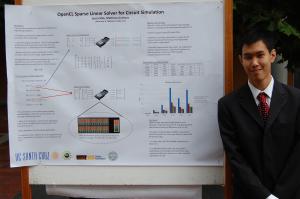Jason Mak: OpenCL Sparse Linear Solver for Circuit Simulation
| Attachment | Size |
|---|---|
| 462.88 KB | |
| 232.01 KB |
Jason Mak will be a fourth-year computer science student at California Polytechnic State University in San Luis Obispo, CA in Fall 2010. Jason worked with professor Matthew Guthaus this summer at the UC Santa Cruz VLSI Design and Automation Group (VLSI-DA), experimenting with parallel linear systems solvers used in circuit simulation. Linear systems are commonly found in many fields of science and engineering. Circuit analysis, in particular, can generate very large, sparse systems that are quite time-consuming to solve. Much research has been done seeking new ways to parallelize computational algorithms used in solving these systems.
Nowadays, graphics cards are no longer devices used only to display, but can perform heavy general purpose computation as well. The innate parallel architecture of GPUs and the numerous processing cores they possess make them well-suited for running math intensive, parallel algorithms. Therefore, GPUs have seen much increased use in scientific applications, including circuit simulation.
The advent of parallel computing on GPUs has allowed researchers and scientists to develop parallel applications that can run on their personal computers. OpenCL (Open Computing Language) is a fairly new framework designed for writing such applications. Being open source and having a platform independent nature, OpenCL may appeal to an increasingly wider range of users and developers. With tools like OpenCL, we may see more publicly available computational libraries for GPUs, including linear algebra libraries, that can be integrated into existing tools for a speedup. Jason found his research in the SURF-IT program to be quite interesting. His experiences this summer helped encourage him to pursue a career in research.
